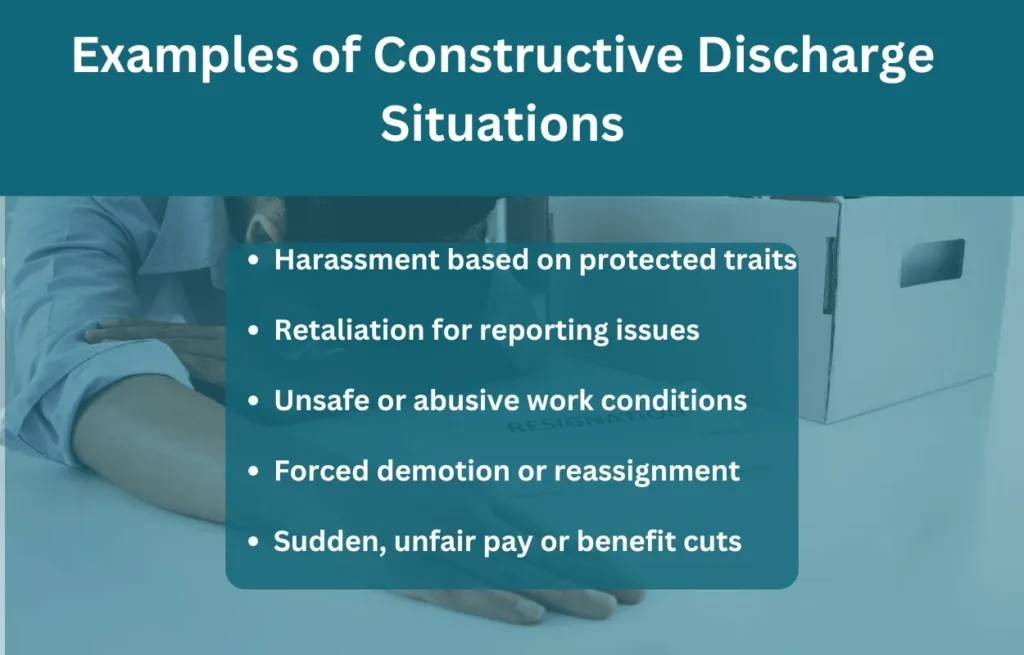Quitting a job can be stressful but what if you felt you had no other choice? If you were essentially forced to resign because of intolerable working conditions, the law may still protect your rights. In Oregon, this situation is known as constructive discharge, and it can have the same legal consequences as being fired.
At Meyer Employment Law, we help employees throughout Oregon navigate complex workplace situations including constructive discharge claims. If you believe you were forced to quit due to discrimination, retaliation, harassment, or another unlawful employment practice, our firm is here to guide you. Contact us today to explore your legal options.
Also Read:
Unlawful Termination Due to Sick Leave in Oregon: Insights from Meyer Employment Law
Unlawful Termination Due to Maternity Leave in Oregon
How to File a Job Discrimination Complaint in the State of Oregon
What Is Constructive Discharge in Oregon?
Constructive discharge occurs when an employee resigns because their working conditions have become so unbearable that any reasonable person in the same position would feel compelled to quit. While technically a resignation, the law treats it as a termination initiated by the employer.
This legal concept recognizes that some employers may not explicitly fire an employee, but may instead create or allow a work environment that becomes intolerable. In such cases, the resignation does not break the chain of liability for wrongful termination or other workplace violations.
Key Elements of Constructive Discharge
To successfully claim constructive discharge under Oregon law, employees typically must prove:
- Intolerable Working Conditions: Conditions must be so difficult or unpleasant that a reasonable person would feel forced to resign.
- Employer Knowledge: The employer knew or should have known about the conditions but failed to correct them.
- Unlawful Conduct or Motive: The resignation stemmed from illegal conduct, such as discrimination, harassment, retaliation, or a violation of public policy.

Examples of Constructive Discharge Situations
While every case is unique, the following are common scenarios that may lead to a constructive discharge claim:
- Persistent harassment based on race, gender, age, sexual orientation, or other protected characteristics
- Retaliation after reporting unlawful behavior or participating in a workplace investigation
- Unsafe or abusive work environments that threaten physical or mental well-being
- Unreasonable demotion or reassignment meant to pressure an employee to quit
- Sudden and severe pay cuts or benefit losses without justification
These examples highlight the importance of documenting any changes in working conditions and notifying your employer in writing whenever possible.
Your Rights Under Oregon and Federal Law
Both Oregon employment laws and federal statutes protect employees from being forced out of their jobs under unlawful circumstances. If you can prove that your resignation was a direct result of discriminatory or retaliatory treatment, you may be entitled to the same remedies as someone who was wrongfully terminated. This may include:
- Back pay and lost benefits
- Reinstatement or front pay
- Emotional distress damages
- Punitive damages
- Attorney’s fees and legal costs
At Meyer Employment Law, we help employees evaluate whether their resignation could legally be considered a constructive discharge—and if so, build a compelling case.

What To Do If You Believe You’ve Been Constructively Discharged
If you believe your resignation was effectively a termination caused by your employer’s conduct, take the following steps:
- Document Everything: Keep detailed records of all incidents, including dates, witnesses, and communications.
- Report Internally: If safe to do so, report your concerns to HR or a supervisor to give your employer a chance to remedy the situation.
- Consult Legal Counsel: Don’t delay in speaking with an employment attorney—your time to file a legal claim may be limited.
- File a Complaint: You may have the option to file a claim with the Oregon Bureau of Labor and Industries (BOLI) or the Equal Employment Opportunity Commission (EEOC).
Our firm can walk you through these options and ensure that your rights are fully protected at every step.
Protecting Your Workplace Rights in Oregon
Constructive discharge can be challenging to prove, but it offers vital legal protection for employees who are treated unfairly or unlawfully pressured to quit. If you’ve been pushed out of your job and suspect your resignation wasn’t truly voluntary, Meyer Employment Law is here to help.
We represent employees across Oregon in all areas of employment law—including wrongful termination, harassment, and retaliation claims. Contact us today for a confidential consultation and take the first step toward holding your employer accountable.



